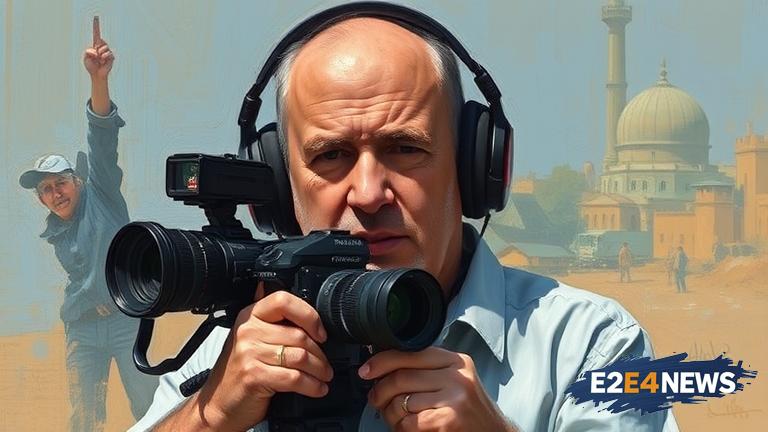A recent statement made by Israeli journalist Zvi Yehezkeli has ignited a firestorm of controversy, with many condemning his remarks as a blatant attack on press freedom. Yehezkeli, a well-known correspondent, appeared to suggest that Palestinian journalists are legitimate targets, sparking widespread outrage and calls for accountability. The comments were made in a recent interview, where Yehezkeli seemed to imply that Palestinian reporters are not impartial and are therefore fair game. This statement has been widely criticized, with many arguing that it undermines the fundamental principles of journalism and puts the lives of Palestinian journalists at risk. The incident has highlighted the precarious situation faced by journalists in the region, who often find themselves caught in the crossfire of the Israeli-Palestinian conflict. Palestinian journalists have long faced challenges in reporting on the conflict, with many facing harassment, intimidation, and even violence. The comments made by Yehezkeli have been seen as a disturbing escalation of this trend, with many fearing that they could embolden Israeli forces to target Palestinian journalists with impunity. The incident has sparked a heated debate about the role of journalism in the conflict, with many arguing that reporters have a critical role to play in holding those in power to account. However, the comments made by Yehezkeli have raised concerns that this role is being undermined by a culture of impunity and aggression towards journalists. The Israeli government has faced criticism for its treatment of Palestinian journalists, with many accusing it of attempting to silence dissenting voices. The incident has also sparked a wider debate about the impact of the Israeli-Palestinian conflict on press freedom in the region. Many have argued that the conflict has created a culture of fear and intimidation, where journalists are reluctant to report on sensitive issues for fear of reprisal. The comments made by Yehezkeli have been seen as a symptom of this broader problem, with many calling for greater protections for journalists and a more robust defense of press freedom. Despite the backlash, Yehezkeli has refused to apologize for his comments, sparking further outrage and condemnation. The incident has highlighted the need for greater accountability and transparency in the region, with many arguing that journalists must be protected and empowered to report on the conflict without fear of reprisal. The international community has been urged to take action to protect press freedom in the region, with many calling for greater support for journalists and a more robust defense of their rights. The incident has also sparked a wider debate about the role of social media in the conflict, with many arguing that it has created a culture of hate and intolerance. The comments made by Yehezkeli have been seen as a disturbing example of this trend, with many calling for greater action to be taken to combat online hate and harassment. As the situation continues to unfold, many are left wondering what the future holds for press freedom in the region. Will the international community take action to protect journalists and defend their rights, or will the culture of impunity and aggression continue to prevail? Only time will tell, but one thing is certain – the comments made by Yehezkeli have sparked a critical debate about the role of journalism in the conflict and the need for greater protections for journalists. The incident has also highlighted the need for greater awareness and understanding of the challenges faced by journalists in the region, with many calling for greater support and solidarity. As the debate continues to rage on, one thing is clear – the comments made by Yehezkeli have sparked a critical conversation about the future of press freedom in the region. The incident has also sparked a wider debate about the impact of the conflict on civilians, with many arguing that it has created a culture of fear and intimidation. The comments made by Yehezkeli have been seen as a disturbing example of this trend, with many calling for greater action to be taken to protect civilians and defend their rights. The international community has been urged to take action to address the root causes of the conflict, with many arguing that it is the only way to create a lasting and just peace. The incident has highlighted the need for greater diplomacy and dialogue, with many calling for a more robust and sustained effort to resolve the conflict. As the situation continues to unfold, many are left wondering what the future holds for the region. Will the international community take action to address the root causes of the conflict, or will the cycle of violence and aggression continue to prevail? Only time will tell, but one thing is certain – the comments made by Yehezkeli have sparked a critical debate about the future of the region and the need for greater protections for journalists and civilians.
